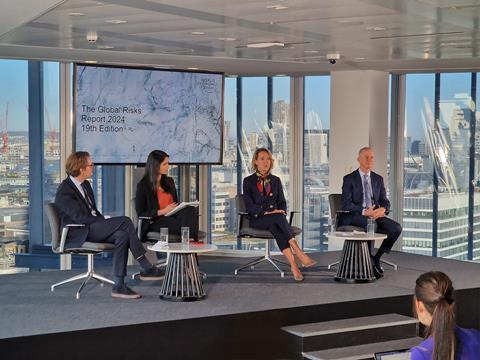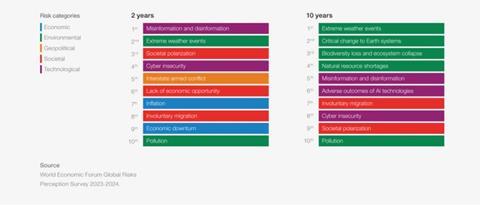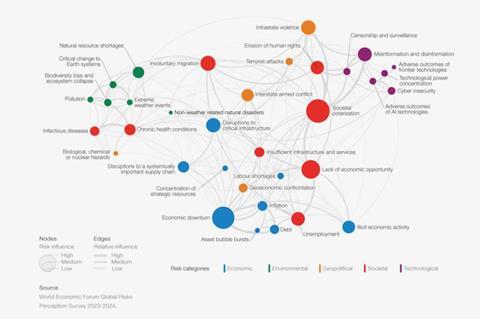The viral spread of fake news and manipulation of the truth online were ranked first, followed by extreme weather events, society’s polarisation, cyber insecurity, and interstate conflict on the roster of short-term risks, according to the WEF’s Global Risk Report 2024.

The World Economic Forum (WEF) has called out the threat of the spread of misleading information – whether deliberately (disinformation) or unintentionally (misinformation) as the top short-term risk, prior to politicians and finance ministers heading to Davos next week.
Environmental threats such as extreme weather events and critical change to Earth systems were regarded as the greatest long-term concern, according to the WEF’s Global Risks Report 2024 (GRR).
The GRR warned that cooperation on urgent global issues “could be in short supply”, putting even greater onus on leaders across government and industry finding new approaches and solutions.
The report from the Geneva-based WEF comes against a backdrop of systemic shifts in global power dynamics, climate, technology and demographics, global risks are “stretching the world’s adaptative capacity to its limit”.
“It’s a very gloomy outlook, but by no means is it a hard-fast, set prediction of the future. The future is very much in our hands,” said Saadia Zahidi, managing director, WEF, speaking at the press conference held in London to launch the report.
See the set of charts below for the two- and ten-year top ten risk rankings, as well as a map of risk interconnectivity.
“There are structural shifts underway, but most of these things are very much in the hands of decision makers across different stakeholders. That’s where the effort clearly needs to be. This should not be seen as a crystal ball,” she added.
Failure to achieve decisive, timely action against climate change, versus the speed of the developing risks, were noted, in the context of a geopolitical shift away from multinational cooperation between world leaders, while noting commitments were leading to positive change.
“It’s just the reality of the world just doesn’t get organised by international cooperation anymore – it’s fragmented and it’s in flux,” said John Scott, head of sustainability risk, Zurich Insurance Group.
“It’s not just all about global cooperation,” he said. “Somebody actually has to do the job, so look what’s happening around local communities. How resilient are you to the physical consequences of climate changes if you’re living in a flood-prone area?”
Risks posed or relating to artificial intelligence (AI) thread through the report.
The veracity of information – from rumbling deep fakes to fact-checking social media posts, poses a huge challenge, Scott suggested.
“In the longer term, technology is tremendously positive, but potentially it could have dystopian consequences as well. It’s about managing the global governance around technology and in some cases it’s about addressing the business models,” said Scott.
Zahidi suggested there would be talks in Davos to try to come up with “principles for how to manage myths and disinformation” online.
She emphasised that the WEF tried to combine “under the radar” complex and severe risks – not just those at the top of the rankings – that share interconnectivity, such as the example below.
Zahidi said rather than just looking at the top few risks, the report provided food for thought about a combination of lesser-ranked risk factors coming together with multiplied results.
“Could we be looking at a situation of a toxic mix of the rise of negative artificial intelligence use, combined with economic hardship, combined with the distress that comes from climate change, together? What does that lead to in terms of a rise of criminality?” Zahidi warned.
AI’s uses mirror its potential abuse, suggested Carolina Klint, chief commercial officer, Europe, Marsh McLennan, going on to suggest its use could accelerate the efforts of cyber attackers and defenders alike.
“I want us to focus on the opportunities of AI, because they are really amazing…but it’s critical that we also understand that it will increase the pace of everything,” Klint said.
She noted the example of the Bangladeshi central bank heist that took place in 2016, from which cyber criminals walked away with $81m.
“They sent out 36 phishing emails to employees at the beginning of 2015. Three were clicked upon and they got into the system,” she said.
It took the hackers at least a year to discover a way to beat the security and navigate the network.
“In 2016, they managed to conduct the attack, but had that been powered by AI would have taken two days. But…the same is true for the response. It took months to backtrack and figure out what’s happened and how to stop it. With AI you could have taken a couple of weeks,” she added.












No comments yet